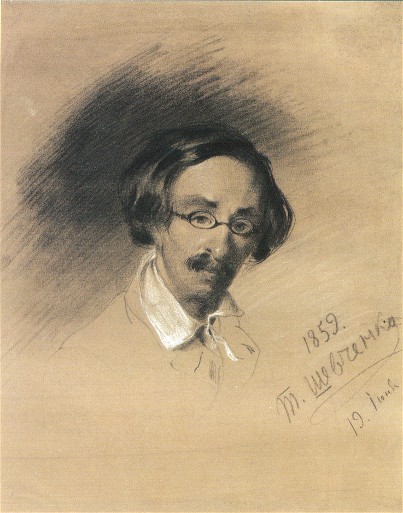Maksymovych, Mykhailo
Maksymovych, Mykhailo [Maksymovyč, Myxajlo], b 15 September 1804 at the Tymkivshchyna estate, near Zolotonosha, Poltava gubernia, d 22 November 1873 at the Mykhailova Hora estate, near Prokhorivka, Zolotonosha county, Poltava gubernia. (Photo: Mykhailo Maksymovych.) Historian, philologist, ethnographer, botanist, and poet. In 1832 he concluded his studies at Moscow University, and remained at the university for further academic work. He lectured in botany. In 1833 he received his PH D and was named professor for the chair of botany in Moscow University. In 1834 he was appointed professor of Russian folk literature at Kyiv University, and that year he became the university's first rector, a post he held until 1835. Owing to ill health he retired in 1845, and he devoted the rest of his life exclusively to scientific and literary work, which he engaged in on his estate, Mykhailova Hora. Notwithstanding his authority as an academic (he was an honorary member of numerous Ukrainian and Russian universities and many scientific societies) he was made a corresponding member of the Russian Academy of Sciences only toward the end of his life, in 1871. Maksymovych's learning was of encyclopedic dimensions and covered an unusually wide range, from botany to history. His scientific work in the field of the natural sciences was published in the 1820s and 1830s. That work, such as O sistemakh rastitel’nogo tsarstva (On Systems of the Plant Kingdom, 1827), Osnovaniia botaniki (The Foundations of Botany, vols 1–2, 1828–31), Razmyshleniia o prirode (Reflections on Nature, 1833), not only met the standards of contemporary science but proposed a new methodology.
As a folklorist Maksymovych published collections of Ukrainian folk songs Malorossiiskie pesni (Little Russian Songs) in Moscow in 1827 and Ukrainskie narodnye pesni (Ukrainian Folk Songs) in 1834. A third anthology, Sbornik ukrainskikh pesen (A Collection of Ukrainian Songs, pt 1), was published in Kyiv in 1849. Maksymovych's publications on folklore had a major influence on Ukrainian folklore studies, even in Galicia. They also created interest in Ukrainian folklore in other Slavic nations (especially among Russians, Poles, and Czechs) and also in Great Britain and America. In the field of philology Maksymovych published many papers on the classification of Slavic languages (1838, 1845, and 1850), in which he extensively used examples from Ukrainian. He was also the author of an etymological spelling, the maksymovychivka. As a literary scholar Maksymovych studied Slovo o polku Ihorevi (The Tale of Ihor's Campaign) and transcribed it into contemporary Ukrainian. He wrote Istoriia drevnei russkoi slovesnosti (The History of Old Rus’ Literature, vol 1, 1839). In addition he translated the Psalms into Ukrainian and wrote several poems (of note is the one dedicated to Taras Shevchenko, ‘Oi, iak duzhe za Toboiu tuzhyla Vkraïna’ [O, How Ukraine Has Longed after You]). Maksymovych published the anthologies and almanacs Dennitsa (1830–4), Kievlianin (1840–1, 1850), and Ukrainets (1859, 1864).
Maksymovych adhered to the then-popular idea of romanticism and identification with the peasant ethnos (narodnist'). He defended the theory of the organic link between the Princely era and Cossack era in Ukrainian history, to which he devoted much research and many articles, critical notes on sources, and other writings. In his article ‘O mnimom zapustenii Ukrainy’ (On the Imaginary Desolation of Ukraine, 1857) and in letters to Mikhail Pogodin, Maksymovych exposed the faulty basis of Pogodin's hypothesis of the ‘Great Russian’ population of the Kyiv principality during the Princely era. The works of Maksymovych on the history of Rus’, on Kyiv, and its historic monuments are numerous; among them are Ocherk Kieva (Essay on Kyiv, 1847) and Pis’ma o Kieve k M. Pogodinu (Letters about Kyiv to M. Pogodin, 1871). He wrote many articles on the history of the Cossack period, the Hetman state, and the haidamaka uprisings (on Hetman Petro Konashevych-Sahaidachny, for example) and Istoricheskie pis’ma o kazakakh pridneprovskikh (Historical Writings on the Dnieper Region Cossacks, 1863–5), Pis’ma o Bogdane Khmel’nitskom (Writings about Bohdan Khmelnytsky, 1859), and Bubnovskaia sotnia (Bubniv Company, 2 vols, 1848–49). His research in those areas was significant for the development of Ukrainian historiography.
Maksymovych also worked in the field of Ukrainian archeology and was the author of the first archeological report using the typological method in Ukraine, Ukrainskie strely drevneishikh vremen ... (Ukrainian Arrows of More Ancient Times ..., 1868). His work in the natural sciences and history found common ground in his philosophical work. Following Freidrich Wilhelm Joseph von Schelling's philosophy of nature, Maksymovych claimed that the study of nature and society should be based on scientifically researched facts. Research should be ‘rigorously analytical and carefully synthetic, and thus positive’ because ‘philosophy can be found in every work of the mind,’ and ‘all learned disciplines should be philosophy.’ ‘Regarding the various sciences, or various branches of knowledge, one all-encompassing philosophy ought to be used, right down to fine details.’ His historical and philological work has been collected in three volumes, edited by Oleksander Kotliarevsky and published in Kyiv in 1876–80. His correspondence has been only partially published, in Kievskaia starina (1904); his autobiography also appeared there (1904, no. 9). The Maksymovych archival collection is located in the manuscript division of the National Library of Ukraine and, partially, in the Central State Archive of Literature and Art in Moscow.
BIBLIOGRAPHY
Ponomarev, S. M. Maksimovich (Saint Petersburg 1871)
Iubilei M.A. Maksimovicha (Kyiv 1871; 2nd edn, Saint Petersburg 1872)
Grushevskii, A. ‘M.A. Maksimovich,’ in Izvestiia Otdeleniia russkogo iazyka i slovesnosti Imperatorskoi akademii nauk, vol 1 (Saint Petersburg 1906)
Popov, P. M.O. Maksymovych (Kyiv 1954)
Ostrianyn, D. Svitohliad M.O. Maksymovycha (Kyiv 1960)
Popov, P. Pershyi zbirnyk ukraïns’kykh narodnykh pisen’: Ukraïns’ki pisni, vydani M. Maksymovychem (Kyiv 1962)
Korpaniuk, M. Dzvin predkivs'skoi slavy: ‘Slovo pro Ihoriv pokhid’ v opratsiuvanni Mykhaila Maksymovycha (Kyiv, 2003)
Oleksander Ohloblyn
[This article originally appeared in the Encyclopedia of Ukraine, vol. 3 (1993).]
.jpg)
 cover.jpg)

.jpg)